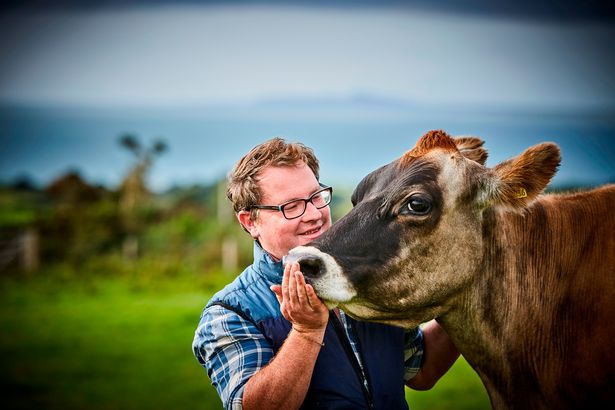
An advocate of regenerative farming will now scale up his enterprise after receiving industry funding to study the practice in Europe.
Welsh farmer Matt Swarbrick gained the travel funds and visited Sweden, France, England and Austria to find out more about regenerative farming.
He advocates that the practice can produce more and better quality food.
Swarbrick, who farms using practices that increase biodiversity and enrich soils, says even areas of farmland considered marginal are capable of producing food in a profitable way.
The former television producer started farming in 2012, on 30 hectare Henbant Bach near Caernarfon.
He and his wife Jenny have embraced regenerative agriculture, a conservation and rehabilitation approach to food and farming systems, establishing flocks of sheep and laying hens, a micro-dairy and a market garden.
After the trip to Europe, the farming couple are now ready to scale-up the enterprise.
To inform their future plans, Swarbrick was awarded funding from the Welsh government's Farming Connect Management Exchange Programme to visit small-scale permaculture-based farms producing food as well as financial and environmental profits.
His study took him to Sweden, France and England, and to Kerameterhof, one of Europe’s oldest permaculture-based farms, based in Austria.
Permaculture is a set of design principles and ethics for human systems that directly utilise the patterns and resilient features observed in natural ecosystems.
“I came away with a huge amount of affirmation from the Kerameterhof that using permaculture at a farm scale can really work and can do so in a way that creates a whole farm ecosystem that bursts with diversity and life,” he says.
“It made me understand that these things are worth doing; indeed I don’t think there is another way we can do things.”
The study reinforced his belief that farming is the most powerful tool society has to make positive changes to the environment and that, by applying permaculture and agro-ecological methods, farmers can produce healthier food in greater quantities and with more profit.
It is possible to have farms that ever increase in resilience, he believes.
“I believe we (the farming industry) are too busy trying to make farming less harmful, less damaging and more sustainable.
“In this we are completely missing the point that producing food can be a positive thing, it can make for stronger, richer ecosystems, offer more job creation and produce healthier food and hence healthier people.”
The only limitation to a farm’s productivity is the farmer’s imagination, Swarbrick reckons: “Even areas that we think of as being marginal are very capable of producing food in a profitable way.”
Plans for Henbant have moved forward since Matt returned from the Exchange Programme.
“Going over the farm designs with all these individuals has affirmed some things we wanted to do, challenged others and offered fresh ideas as well,” he says.
“It has cemented our ideas that we do want to provide more opportunities for employment on the farm and it is clear that within food production we can provide at least two extra full time, if seasonal, roles.”
The Swarbricks will create more agroforestry and silvopasture - a combination of trees and pasture - at Henbant and expand their no-dig market garden.
They will continue developing their micro dairy, to six cows by end of 2020, and develop a pastured, laying hen enterprise, aiming for 1000 layers by 2021.
They will also work with Joseph Holzer of Kerameterhof to develop their lakes into a more complex system for aquaculture.
“We have already implemented some of his plans and have introduced commercial fish species into the lakes,” says Matt Swarbrick.
Above all, he aims to raise awareness of the concept that the future of farming is not about limiting its impact on the environment.
“It is about the positive impact that regenerative agriculture can have.”
The application window for the 2019-2020 Management Exchange programme is open until 30 November.
Up to £2,500 of funding is available to cover travel expenses, accommodation and specialist advice.
